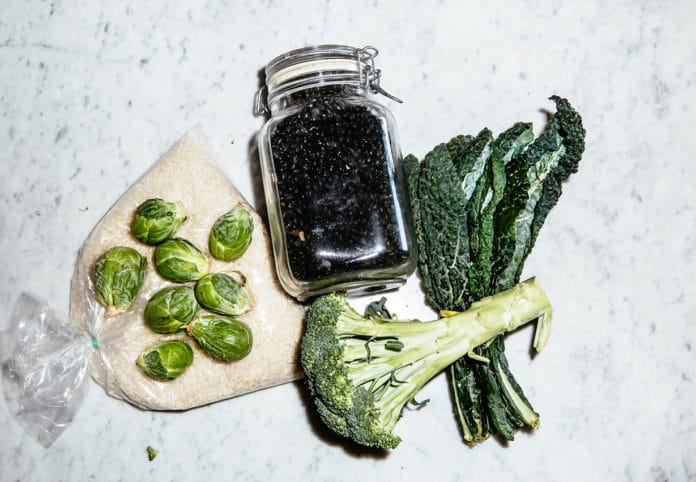This article is in response to some questions I had from my last article, “Protein: How Much Do We Really Need?” In that article, I talked about the importance of protein for maintaining muscle mass, and why that’s important. I had some questions come to me after that article asking if it’s possible to get not only enough protein but the right type, from vegan or vegetarian diets. Hopefully, the following will help point you in the right direction.
Can I get enough protein on a vegan or vegetarian diet?
The short answer to that question is yes you can! A common misconception is that protein is only found in animal products like red meat, poultry, eggs, fish, etc. The truth is that nearly all foods contain some protein whether they’re from a plant or animal source. There are differences in the quantities and the amino acid profile between plant- and animal-based foods. However, this doesn’t mean you can’t meet your daily protein needs from a plant-based diet.
What makes plant-based proteins different?
Just a quick refresher: Proteins are made up of strings of amino acids. There are differences in the proteins that make up different parts of our body. For instance, the protein in our muscles is different from the protein in our hair. What differentiates one type of protein from another is the amino acids they are constructed from and the sequence that they are assembled in.
Our cells are pretty clever and can disassemble some amino acids to make other amino acids. These types of amino acids are called non-essential amino acids because we can produce them in our body as long as we are getting sufficient amounts of protein. However, there are some amino acids that our body can’t make or, if it can, the amounts are too small to meet our needs. These are the essential amino acids which we need to get from our diet.
You might have heard people say that plant-based foods don’t contain all the essential amino acids. This isn’t really the case. Generally, plant-based foods do contain all the essential amino acids. It’s just the amounts or proportions that vary. For instance, in general, legumes have a higher proportion of the essential amino acid Lysine compared to grains, while grains have a higher proportion of another essential amino acid, Methionine. The table below shows some comparisons between grains and legumes. I’ve included chicken to show that the proportion of Methionine in grains and the proportion of Lysine in legumes is close to the amounts found in chicken.
| Food | Lysine | Methionine |
| Chicken | 20.49% | 6.67% |
| Split peas (legume) | 20.07% | 2.84% |
| Lentils (legume) | 19.08% | 2.33% |
| Brown Rice (grain) | 10.33% | 6.06% |
| Oats (grain) | 14.09% | 4.85% |
These figures are a percentage of total essential amino acids in each food.
How does this affect my plant-based food choices?
The concept I’m trying to convey is that by including a variety of plant-based foods in your diet, you get a complimentary effect between foods; this is particularly true with grains and legumes. If you include a variety of these in your diet, you’ll be covering your essential amino acid needs! No need to get any more complicated than that. Try to include a variety of these two food groups in your diet every day.
Should I add a protein supplement to my diet?
If you’re regularly in the gym or training for a sports event, you may be wondering if you should add a protein supplement to your diet. I would answer this the same way I would to anyone who isn’t vegetarian or vegan. If you feel you aren’t getting enough protein, then having a protein shake may be an option for you. There are plenty of plant-based protein powders on the market now. If you’re trying to build some extra muscle, have a look for protein powders with higher Leucine. If you aren’t sure if you are getting enough protein from your diet, it’s worth talking to a registered nutritionist or dietitian.
Any other nutrients I’ll miss on a vegan diet?
That’s about as complicated as it gets regarding protein for people on plant-based diets. However, there are some things to be aware of, particularly with vegan diets. You may need to make some adjustments to make sure you’re getting enough B12, calcium and a few other nutrients. This can also usually be addressed within your diet. If that’s something you are concerned about, let me know and I can make that the topic of a future article.
If you have any questions or would like some more specific advice, you can contact me through the contact form on my website www.fitbeyondfifty.com.au
Daryl is the founder of Fit Beyond Fifty, an online health and fitness resource for those of us who are aged fifty and over who are looking to remain fit, healthy and strong into the future. Fit Beyond Fifty provides evidence-based nutrition and fitness resources to help you remain healthy and active and enjoying life!
Daryl is a nutritionist and personal trainer with a masters degree in Human Nutrition and a diploma in Fitness. He has over 20 years of experience in the fitness industry and has a background in strength training and endurance training that spans over 40 years. He is a two-time Australian champion powerlifter and holds 2 Australian records which have remained unbroken for over 18 years. He also has experience in endurance sports having completed 7 Ironman 70.3 triathlons and numerous sprint triathlons.



